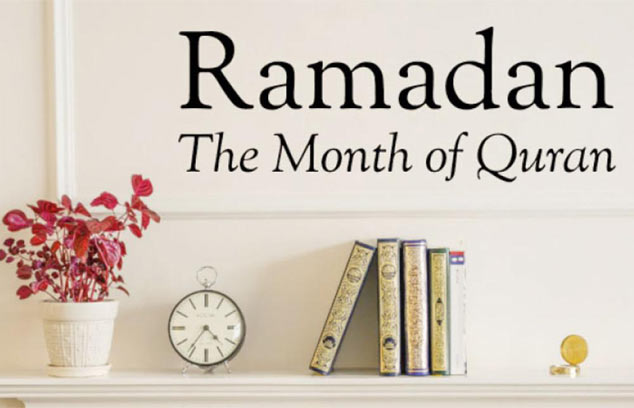Ramadan is the month of fasting, and it is also the month of Qur’an. It was during Ramadan that the first verses of the Qur’an were revealed to Prophet Muhammad (peace be upon him).
{The month of Ramadan [is that] in which was revealed the Qur’an, a guidance for the people and clear proofs of guidance and criterion.} (Chapter 2, verse 185 of the Holy Qu’ran)
Eager to gain the rewards in this month, many of us rush to read the entire Qur’an and we compete to complete even more than once before the month is over. While dedicating your time to reading the Qur’an is no doubt praiseworthy, I call upon my Muslim brothers and sisters to take a slightly different approach this Ramadan.
Rather than hastily reading through, why not pick a certain chapter or chapters of the Qur’an and delve deeply into the meanings of the verses, the lessons to be learned, the context in which they were revealed during the life of Prophet Muhammad (peace be upon him), studying the history, and also the implications the verses carry for our lives today? Rather than simply, we need to work hard to understand the Qur’an. Alternately, you can pick a certain topic and research it in-depth in the Holy Qur’an, for example, stories of the prophets, or the description of Paradise. Another recommendation is to use the Qur’an as a blueprint to develop your character. For example, study the verses which speak about patience or piety or the characteristics of a believer in general.
For a class which I offer the girls in our community, we picked Surah Al-Israa, the Chapter of the Night Journey, to explore the meanings of the verses, and we have learned a lot and greatly enjoyed the classes.
The Qur’an, the word of God, is a book of guidance for humanity. Students of the Qur’an never cease to be amazed by the wonders found in it. Researchers have studied the numbers of times that certain words are repeated in the Qur’an which causes us to appreciate the Qur’an even more.
The word ‘day’ (yawm) is repeated in its singular form 365 times, while the plural and dual forms, ‘days’ (ayyam and yawmayn) together are repeated 30 times. The number of repetitions of the word ‘month’ (Shahar) is 12.
The words ‘Paradise’ and ‘Hellfire’ are each repeated the same number of times, 77 times. The significance I draw from this is that the believer must live his/her life in a balance between fear of Allah and fear of the punishment, but also hope in Allah’s mercy and forgiveness, and the yearning to enter Paradise.
The words, ‘world’ (dunya) and ‘Hereafter’ (akhira) are repeated an equal number of times, 115 times. Although there may not be great importance in the numbers, we should ponder on the importance of mentioning this world and the next world an equal amount of times in the Qur’an.
The ultimate priority in a believer’s life is worshiping Allah, but that does not mean we can neglect our duties and responsibilities of building and protecting this Earth. What comes to mind is the saying of Prophet Muhammad (peace be upon him), “If the Resurrection were established upon one of you while he has in his hand a sapling, then let him plant it.” (Musnad Ahmad)
At the same time, we must not become so immersed in this world’s pleasures and problems that we neglect our worship. Neither work nor entertainment should blind us from dedicating enough time to the service of others and worshiping Allah.
Prophet Muhammad (peace be upon him) warned us of becoming entranced by worldly affairs; he said, “By Allah, it is not poverty that I fear for you, but I fear that this world will be spread out in front of you as it was spread out in front of those before you, and then you will vie for it as they vied for it, and it will destroy you as it destroyed them” (Riyad as-Salihin by Imam Nawawi)
Another finding in the Qur’an I marveled over is the reference to the land and sea. The word ‘land’ appears 13 times in the Qur’an and the word ‘sea’ 32 times, giving a total of 45 references. The number of total references to land and sea, 45, divided by the number of references to the sea in the Qur’an, 32, and multiplied by 100 is 71.1%. Extraordinarily, these figures represent the exact proportions of land and sea on the Earth.
{The month of Ramadan [is that] in which was revealed the Qur’an, a guidance for the people and clear proofs of guidance and criterion.} (Chapter 2, verse 185 of the Holy Qu’ran)
Eager to gain the rewards in this month, many of us rush to read the entire Qur’an and we compete to complete even more than once before the month is over. While dedicating your time to reading the Qur’an is no doubt praiseworthy, I call upon my Muslim brothers and sisters to take a slightly different approach this Ramadan.
Rather than hastily reading through, why not pick a certain chapter or chapters of the Qur’an and delve deeply into the meanings of the verses, the lessons to be learned, the context in which they were revealed during the life of Prophet Muhammad (peace be upon him), studying the history, and also the implications the verses carry for our lives today? Rather than simply, we need to work hard to understand the Qur’an. Alternately, you can pick a certain topic and research it in-depth in the Holy Qur’an, for example, stories of the prophets, or the description of Paradise. Another recommendation is to use the Qur’an as a blueprint to develop your character. For example, study the verses which speak about patience or piety or the characteristics of a believer in general.
For a class which I offer the girls in our community, we picked Surah Al-Israa, the Chapter of the Night Journey, to explore the meanings of the verses, and we have learned a lot and greatly enjoyed the classes.
The Qur’an, the word of God, is a book of guidance for humanity. Students of the Qur’an never cease to be amazed by the wonders found in it. Researchers have studied the numbers of times that certain words are repeated in the Qur’an which causes us to appreciate the Qur’an even more.
The word ‘day’ (yawm) is repeated in its singular form 365 times, while the plural and dual forms, ‘days’ (ayyam and yawmayn) together are repeated 30 times. The number of repetitions of the word ‘month’ (Shahar) is 12.
The words ‘Paradise’ and ‘Hellfire’ are each repeated the same number of times, 77 times. The significance I draw from this is that the believer must live his/her life in a balance between fear of Allah and fear of the punishment, but also hope in Allah’s mercy and forgiveness, and the yearning to enter Paradise.
The words, ‘world’ (dunya) and ‘Hereafter’ (akhira) are repeated an equal number of times, 115 times. Although there may not be great importance in the numbers, we should ponder on the importance of mentioning this world and the next world an equal amount of times in the Qur’an.
The ultimate priority in a believer’s life is worshiping Allah, but that does not mean we can neglect our duties and responsibilities of building and protecting this Earth. What comes to mind is the saying of Prophet Muhammad (peace be upon him), “If the Resurrection were established upon one of you while he has in his hand a sapling, then let him plant it.” (Musnad Ahmad)
At the same time, we must not become so immersed in this world’s pleasures and problems that we neglect our worship. Neither work nor entertainment should blind us from dedicating enough time to the service of others and worshiping Allah.
Prophet Muhammad (peace be upon him) warned us of becoming entranced by worldly affairs; he said, “By Allah, it is not poverty that I fear for you, but I fear that this world will be spread out in front of you as it was spread out in front of those before you, and then you will vie for it as they vied for it, and it will destroy you as it destroyed them” (Riyad as-Salihin by Imam Nawawi)
Another finding in the Qur’an I marveled over is the reference to the land and sea. The word ‘land’ appears 13 times in the Qur’an and the word ‘sea’ 32 times, giving a total of 45 references. The number of total references to land and sea, 45, divided by the number of references to the sea in the Qur’an, 32, and multiplied by 100 is 71.1%. Extraordinarily, these figures represent the exact proportions of land and sea on the Earth.
source: saudigazette.com.sa










